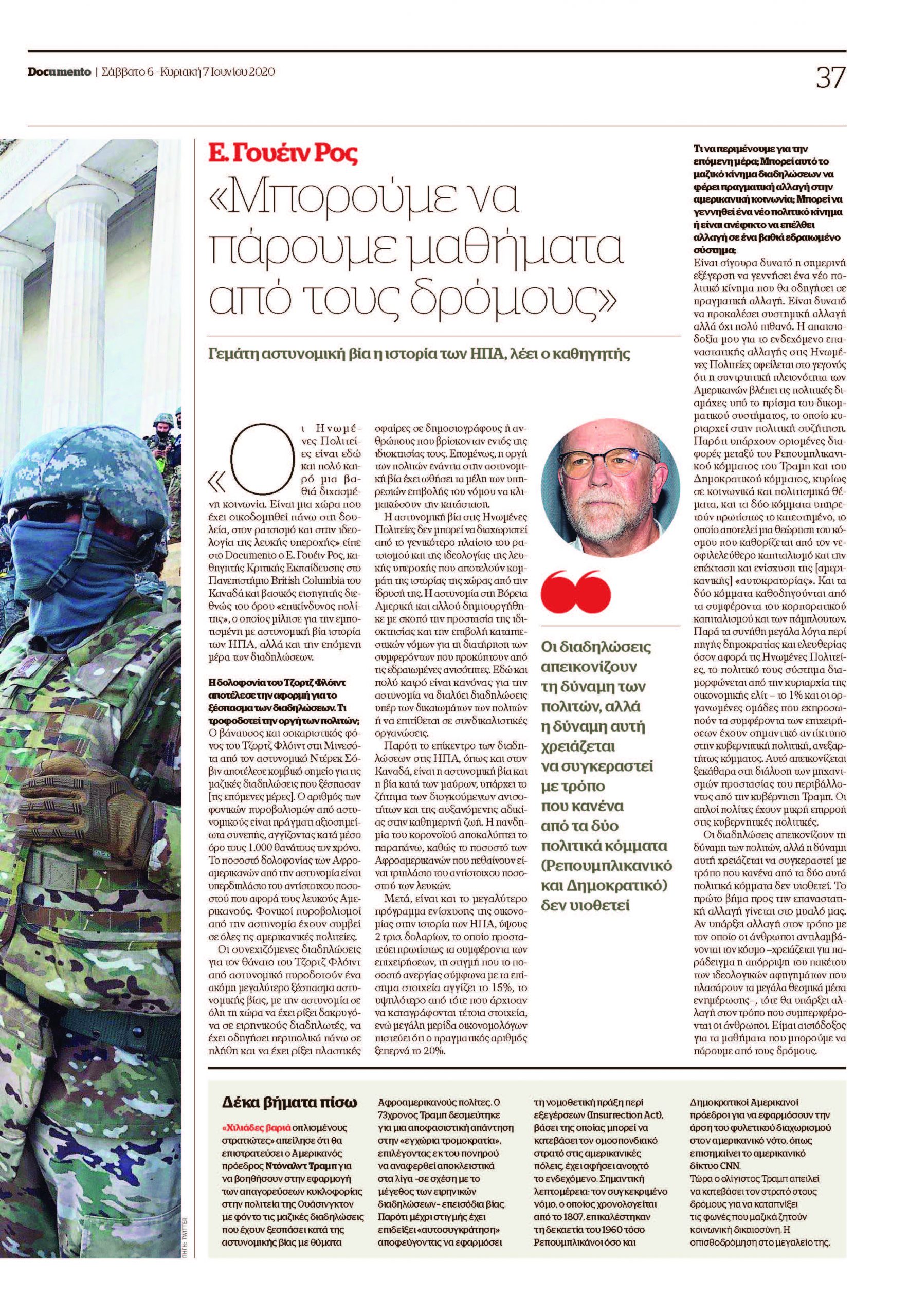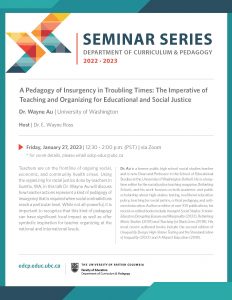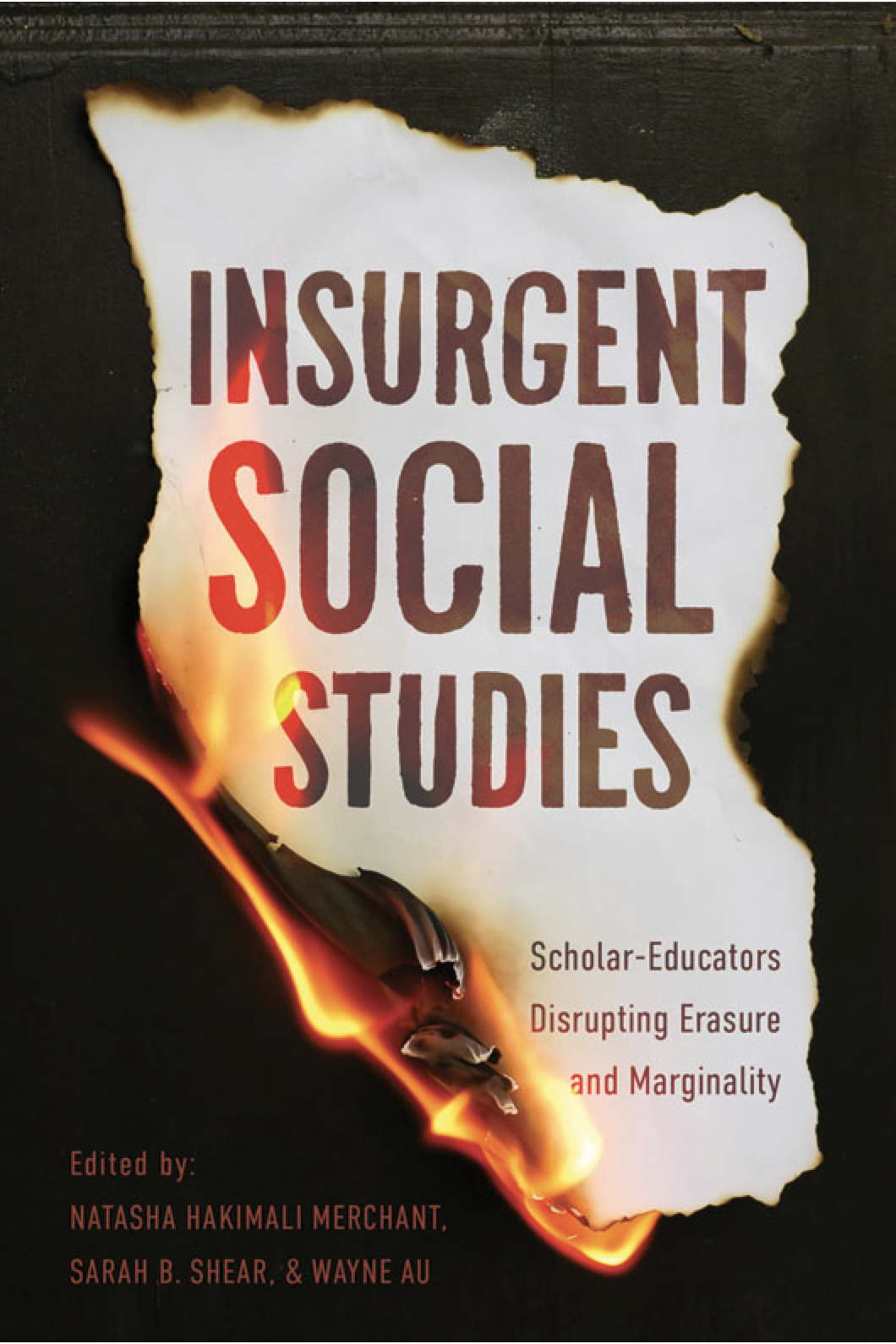Here is a brief interview I did with Anna Papadimitriou for Documento newspaper (Athens, Greece), published in the June 6-7, 2020 edition. English text below.

Documento: The death of George Floyd has sparked massive protests in the United States. It seems that this is one of the “dominoes” that brought people out to the streets. What are the reasons fuelling people’s rage?
EWR: The brutal and horrifying killing of George Floyd in Minneapolis by police officer Derek Chauvin is the tipping point for large scale protests that ripped through over 120 cities in the United States. Floyd’s death is reminiscent of Eric Garner’s 2014 death at the hands of New York City police officer Daniel Pantaleo who placed him in a prohibited chokehold while Garner uttered “I can’t breathe.” But in recent weeks we have also witnessed the police killing of Breonna Taylor in her home in Louisville, Kentucky and Ahmaud Arbery’s shooting death in Georgia by a white ex-police officer. The United States, and African Americans in particular, have suffered from an epidemic of police brutality and killing for years. Since 2014, after Michael Brown, an unarmed black man was gunned down by police in Ferguson, Missouri, there have been over 5,000 Americans shot and killed by police. Indeed, the rate of fatal shootings by police is remarkably consistent, averaging about 1,000 deaths per year. The rate at which African Americans are killed by police is more than twice as high as the rate for white Americans. Fatal police shootings have taken place in every state.
The ongoing protests of the police killing of George Floyd has predictably fostered a further eruption of police violence as police across the country have tear-gassed peaceful protesters, driven police vehicles through crowds, opened fire with rubber bullets on journalists and people on their own property. So the civilians’ rage against police violence has prompted law enforcement officers to escalate the unrest.
Police violence and murder in the United States cannot be separated from the context of racism and white supremacy that has been part of the country’s history and make up since its founding. The police in the North America and elsewhere were created to protect property and enforce repressive laws in the interest of maintaining interests advantaged by status quo inequalities, it has long been the norm for police to break up demonstrations of people advocating for civil rights or to attack trade unionists.
While the focus of protests in the US as well as in Canada have been in response to police violence and violence against black people there is the matter of the growing inequalities and inequities in everyday life. The coronavirus pandemic illustrates this as African Americans are dying from COVID19 at three times the rate of white people, as does continued lack of access to adequate health care for all Americans, the attack on women’s rights to make decisions about their own health, etc.
Then there is the largest bailout in the history of the US, USD 2trillion, which primarily protects the investor class and corporate interests, while 40 million workers are without jobs. The official US unemployment rate is now nearly 15%, the highest since records began. And most economists believe that the real figure is above 20%.
Documento: President Trump is evidently a polarizing figure who is adding fuel to the fire, but it is evident that the American society as a whole is deeply fragmented and polarised.
EWR: The United States has long been a fragmented and deeply divided society. It is a country that has been built on slavery, racism, and white supremacy. The US Civil War, fought over slavery, begat continuing conflict over the racism and access to civil rights that has never been resolved. At the end of the First World War in 1919, Black Americans experienced the deadliest episode of races riots and lynching in US history. The apartheid society of the US continued to function well into the 1960s with de facto racial segregation continuing for years in housing and schools. The Black Lives Matter movement is a response to the cumulative impact of white supremacy and the longstanding fatal inequalities it produces.
Trump is certainly a polarizing figure and he added fuel to the fires with his ever increasing authoritarian and now clearly fascist rhetoric. At his political rallies and in his public statements Trump has offered encouragement and apologies for white supremacists and neo-Nazi groups. His remarks about Unite the Right rally in Charlotteville, Virginia in 2017 were particularly flagrant. Trump’s approach has been to produce chaos and division rather than seek peace, reconciliation, solution to problems. By all accounts, his personal as well as domestic and foreign policy are at heart based upon bullying and authoritarianism and laced with ignorance and incompetence. This can be seen in his rhetoric regarding China and North Korea for example as well his characterization of US protesters as “terrorists,” his belligerent attitude toward state governors’ handling of the protests, his lack of empathy for 100,000+ coronavirus victims and his failure to manage pandemic.
Documento: What should we expect for the next day? Can these protests bring real change to the American society? Can a new political movement be born out of these protests? Or more is needed to bring change in an already established system?
It is absolutely possible for the current uprising to spawn a new political movement that leads to real change. It is possible, but not likely to produce systemic change. My pessimism for revolutionary change in the United States is because the vast majority of Americans see political conflicts through the lens of the two party system that dominates the political narrative. White there are some differences between the Trump’s Republican Party and the Democratic Party, particularly on social and cultural issues, both parties are supremely committed to the status quo, which is a view of the world that is defined by neoliberal capitalism and the extension and strengthening of empire. Both parties are driven by the interests of the corporate capitalism and of the super-rich. Despite the common rhetoric of the United States as a fountain of democracy and freedom, its politics is defined by economic-elite domination – the one percent and organized groups representing corporate interests have substantial independent impact on government policy. This is clearly illustrated in by the Trump administrations dismantling of environmental protections. Average citizens and mass-based groups have little influence on government policies. The protests illustrate the power of the people, but that power needs to coalesce in forms that are not coopted by either of the reigning political parties. The first step toward revolutionary change takes place in the mind. If there is change in the way people start to understand the world — such as rejecting the packaged ideological narratives of major corporate media — then there will be a change in the way people behave. I am optimistic about what can be learned in the streets.

 Follow
Follow


